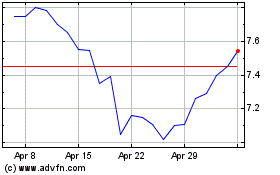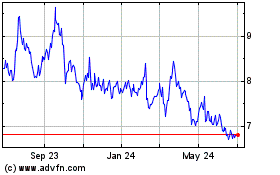At Small Japan Auto Makers, Advanced Gas Models Match, Undercut Green Cars
December 02 2010 - 2:26AM
Dow Jones News
Instead of investing heavily to develop hybrids and plug-in
cars, like the Leaf being unveiled in Japan Friday by Nissan Motor
Co. (7201.TO), Mazda Motor Corp. (7261.TO) and Daihatsu Motor Co.
(7262.TO) are rolling out new-generation gasoline-powered cars
boasting enhanced fuel economy and cheaper price tags. And it's a
gambit that some analysts say could pay off in the near term -- as
long as gas prices stay low.
Back in 1997, when Toyota Motor Corp. (7203.TO) proudly unveiled
the world's first mass-market hybrid, the auto maker trumpeted the
first generation Prius' fuel economy of 28 kilometers per liter.
Next year, Mazda plans to launch a comparatively inexpensive
compact car it says will run for 30 km on a liter of gas -- without
the help of electric motors.
"Gasoline prices are relatively stable. They are neither cheap
nor expensive," said Koji Endo, analyst at Tokyo-based independent
research Advanced Research Japan, referring to pump prices now
about 29% below record highs. "In this environment, electric
vehicles or hybrids won't likely become the top popular models
immediately...There is a chance in the short-term" that compact
cars could beat some hybrids."
German and Japanese car makers, such as Volkswagen AG (VLKAY)
and Toyota, have long set the pace for the industry on introducing
fuel-saving technologies. For Mazda and Daihatsu, analysts say the
new, high-efficiency compacts could offer a way to make up ground
while operating with R&D budgets that are between less than a
tenth and a fifth of such spending by Japan's 'big three' --
Toyota, Nissan and Honda Motor Co. (7267.TO).
With shares of about 4.4% and 13% respectively of Japan's market
for new cars, Mazda and Daihatsu are firmly stuck in the big
three's shadow at home. But the pair aim to tap overseas markets
with plans to introduce their new technologies in North America,
Europe and other markets in the coming years.
In Japan, hybrid car sales more than tripled last year from the
previous year, driven by the red-hot remodeled Toyota Prius and
also helped by government buying incentives, bucking the downtrend
in the overall market of a 9.3% fall as budget-conscious consumers
concerned about the fate of Japan's then-recessionary economy
reined in spending. Still, hybrids accounted for just 7.8% of the
whole market in 2009, or 347,729 vehicles in total.
Mazda, Japan's fifth-biggest car maker by sales volume, said
last month that it will market its redesigned gasoline-engine Demio
compact in the first half of next year in Japan. The Demio is set
to become one of the most fuel-efficient gasoline cars in the
country with a fuel-economy rating of 30 km/l.
That's below the 38 km/l Toyota's latest Prius model gets, but
it matches other hybrids including the recently launched new
version of Honda's Fit hybrid.
And Mazda plans to undercut the price of hybrids like the Fit,
according to Mazda Chief Executive Takashi Yamanouchi. "We will
probably have to set the prices (for the new Demio) lower" than the
bottom price of the Fit hybrid of Y1.59 million ($19,157),
Yamanouchi told reporters last month.
How will the big three respond? Not with any radical moves,
analysts say: operating margins on lower-priced compact cars are
wafer-thin, and the business model for the new-generation cars is
entirely dependent on one factor beyond the control of any auto
maker on the planet--gasoline prices. And the likes of Goldman
Sachs expect crude oil futures to bubble up to $101 over the next
12 months on the New York Mercantile Exchange - from the recent
levels around $84.
Nissan Chief Operating Officer Toshiyuki Shiga agrees that there
is no single technology to meet all customer requests. Asked last
month about the potential competitiveness of the company's Micra
compact -- offering 26 km/l with a price tag of around Y1.2 million
-- Shiga said those who often drive in the city probably prefer
hybrids.
Still, there will soon be another potential rival from Daihatsu.
Japan's seventh-largest car maker is developing a new mini car
based on a concept vehicle called 'e:S' unveiled at last year's
Tokyo auto show. The new 660cc-gasoline engine car will be as
fuel-efficient as the new Mazda Demio, and will hit the domestic
market next year.
Proponents of the new wave of ultra-efficient gasoline engine
cars need to make hay not just in terms of low gas prices, but also
while they have closed the gap in terms of fuel economy.
Just as the big guns dip into their R&D coffers to develop
more advanced electric systems for their hybrid cars, they are also
aiming to improve the efficiency of the conventional engine side of
the hybrid systems.
Toyota, for instance, said earlier this month that it will begin
sales of its first compact hybrid that can drive more than 40 km/l
by the end of 2012. And by early 2012, it plans to sell the plug-in
version of the Prius hybrid, whose prototype can run 57 km/l.
-By Yoshio Takahashi, Dow Jones Newswires; 81-3-6269 2791;
yoshio.takahashi@dowjones.com
TALK BACK: We invite readers to send us comments on this or
other financial news topics. Please email us at
TalkbackAsia@dowjones.com. Readers should include their full names,
work or home addresses and telephone numbers for verification
purposes. We reserve the right to edit and publish your comments
along with your name; we reserve the right not to publish reader
comments.
Nissan Motor (PK) (USOTC:NSANY)
Historical Stock Chart
From Jun 2024 to Jul 2024

Nissan Motor (PK) (USOTC:NSANY)
Historical Stock Chart
From Jul 2023 to Jul 2024
